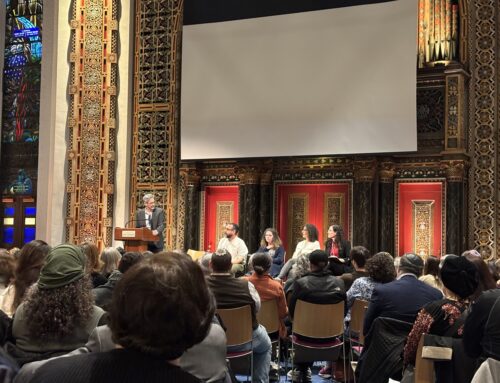Barak Ravid, Trump’s Peace: The Abraham Accords and the Reshaping of the Middle East,
trans. Sahar Zivan (Independently Published, 2023)
Daniel Bar-Tal, Sinking Into the Honey Pot: The Case of the Israel-Palestine Conflict,
trans. Barbara Doron (Washington, DC, 2023)
By Peter Eisenstadt
There’s Fraktur. On 3 January, 1941 the Nazi government banned the use of Fraktur fonts in all publications, calling them Jewish and un-Germanic, though Fraktur seems pretty echt-deutsch to me, not that Nazi antisemitism is supposed to make sense. (𝔉𝔬𝔯 𝔱𝔥𝔢 𝔠𝔲𝔯𝔦𝔬𝔲𝔰, 𝔱𝔥𝔦𝔰 𝔦𝔰 F𝔯𝔞𝔨𝔱𝔲𝔯, 𝔩𝔦𝔨𝔢 𝔱𝔥𝔢 𝔣𝔬𝔫𝔱 𝔲𝔰𝔢𝔡 𝔦𝔫 𝔱𝔥𝔢 𝔑𝔢𝔴 𝔜𝔬𝔯𝔨 𝔗𝔦𝔪𝔢𝔰 𝔩𝔬𝔤𝔬.) Anyway, since then almost all publications in German have used standard Roman typefaces. I mention this because many years ago I read a history of typography that claimed this edict was the only positive achievement of the Nazi government.
And there’s the Abraham Accords, the normalization agreements between Israel and the UAE, Bahrain, Morocco, and Sudan. (This is not, let us say, a direct comparison as much as a random juxtaposition.) But many people have argued that the Abraham Accords were the solitary positive foreign policy achievement of the Trump-Netanyahu years, or even, according to Barak Ravid, “the single biggest breakthrough in the Middle East peace process in over 25 years.” Since the peace process has been moribund for the past quarter century, this is, even if true, an unremarkable claim. And I suppose I feel the same way about the start of the Abraham Accords as about the end of fraktur type; not all that much. I guess the Abraham Accords are a positive development, if you can see them for what they actually are apart from the glare of the hype.
Ravid is certainly an Abraham Accords booster, but his careful reportage on them in Trump’s Peace is essential reading for anyone interested in their history. Ravid is not exactly a Trump revisionist, but he does argue that “intellectual honesty compels both his supporters and detractors to recognize his failures and successes.” (My first thought—the words “honesty” and “Donald Trump” in the same sentence is a syntactic impossibility.) That said, the Abraham Accords must be accounted for. And Ravid uses Trump to beat up on Netanyahu, which is fine by me, though I would prefer a better cudgel. And it certainly is the case that there is a continuity in US foreign policy towards Israel which remains distressingly bipartisan. Biden has not renounced the move of the US embassy to Jerusalem or the US recognition of Israel’s annexation in the Golan Heights, opened a consulate in East Jerusalem for Palestinians, and has praised and tried to further the Abraham Accords, and is not focused on the big enchilada (or falafel), an Israel-Saudi normalization agreement.
Ravid reminds us that the Abraham Accords were originally part of a Trump administration attempted trifecta; helping Israel to achieve better relations with the Gulf States, strengthening the anti-Iran, anti-Shia alliance and, at the same time, giving an American imprimatur for Israel to formally annex a substantial chunk of Area C of the West Bank—the part already under direct Israeli control; the precise percentage and contours of which to be decided later. Everyone was aware that there had been sub rosa Israel-Gulf States contacts for many years, and the shared goal was to bring them out of the shadows. In June 2019 Jared Kushner, Trump’s son-in-law and Middle East plenipotentiary, announced a tentative plan by which the Gulf States would create a $50 billion fund both to help the Palestinians and to foster closer economic relations between Israel and the participants in the plan. Its political component would be revealed later, which took place in January 2020. Trump, with Netanyahu present, unveiled the plan, which had as its main element a US blessing on Israel annexing up to 30% of Area C in the West Bank, along with, for the Palestinians, the nano-crumb of a possible settlement freeze if they behaved themselves. Trump called it a “win-win,” albeit threatening the Palestinians that “after 70 years of little progress this could be the last opportunity they will ever have.” Netanyahu called it “the deal of the century.”
But the problem was that Netanyahu did not really care about the deal; all he knew was that he believed the US had greenlighted West Bank annexation, and that the Palestinians would essentially get nothing in return. What Trump wanted, however, was a “deal,” in his words, “the ultimate deal,” the “mother of all deals,” a Nobel Peace Prize level deal. Trump, although, he cared bupkis about the Palestinians, knew enough that if there was an American-abetted naked Israeli land-grab, it would be denounced in every Arab capital, and he would not get his deal. So he began to place some pressure on Netanyahu, and the prospects of the annexation began to fall apart. But the Gulf States, especially the United Arab Emirates (UAE) still wanted a deal, and came to its rescue by proposing a normalization of ties with Israel. For Netanyahu this was, if not quite a booby prize, far short of what he really wanted, but he made the best of it, especially because for Trump and Kushner, who had placed better US ties with the Gulf states at the center of their Middle East policies, this was the main objective. After intense negotiations, in September 2020 Israel, the UAE, and Bahrain, under the aegis of the United States, announced the normalization of their ties and the establishment of diplomatic relations. Further normalization agreements were subsequently announced between Israel and Morocco and Sudan. Saudi Arabia, was supportive of the accords, but did not sign a normalization agreement with Israel. But for services rendered, six months after Trump and his extended family were pried out of the White House, one of the Saudi sovereign wealth funds announced a $2 billion investment in Kushner’s fledgling private equity firm.
The most entertaining chapter of Ravid’s book is undoubtedly his account of his interview with Trump at Mar-a-Largo in April 2021, with Trump cursing Netanyahu for congratulating Biden after his election: “I haven’t spoken to him since. Fuck him.” According to Ravid, Trump brought up Netanyahu’s disloyalty five times in the course of the conversation, especially, since according to his lights “I saved his ass in many ways.” (As has been pointed out, if Trump has a single redeeming quality, it is his penchant for turning on his former allies and toadies.) Trump was also annoyed with Netanyahu because, in his opinion, by his obsession with annexation, he blew up the possibility of a peace deal. “In my opinion, Bibi did not want to make a deal. That’s why we went four years without a deal. I feel we could have had a deal with the Palestinians.”
This is no doubt one of Trump’s many delusions, but there are many intelligent observers, like Ravid, who think that the Abraham Accords might indeed be a needed step towards a lasting peace. What can I say? If Israelis want to vacation in Abu Dhabi, if Israeli Palestinians can someday book direct flights from Tel Aviv to Mecca for the hajj, if Israeli companies can peddle their spyware and other products to the Gulf States, and the Gulf States can invest in Israel, okay, that is the way of the world. But it already feels like the last spasm of a dying American Middle East hegemony, a way to try to ward off an uncertain future, in which events such as the Chinese-brokered rapprochement between Iran and the Saudis become the norm. I will grant that increased ties to Arab nations in the last few years complicated and hindered Netanyahu’s annexation dreams, and that’s a good thing. But it is not the “deal of the century”— the problems between Israel and Palestine won’t be resolved in a “deal.” It is not a “game-changer” because the problems between Israel and Palestine are not a game and haven’t been changed, even perhaps worsened. The Saudis can buy the PGA tour, but Israel and Palestine are not golf courses. Only Israelis and Palestinians will solve the Israel Palestine problem.
Ravid berates the Biden administrations for, in its early months, referring to the Abraham Accords as mere “normalization agreements.” (They later restored the original name.) But the name “Abraham Accords,” with its faux sacralization of this gilded bit of realpolitik, is one of the aspects of the accords that has always grated. (And why we’re on the subject, why does no one call them the Ibrahim Accords?) So what would Abraham do? According to both the Torah and the Quran, he would try to make a sacrifice. Abraham and God made a deal to sacrifice his son, but in the end, only the usual goat was sacrificed. And similarly, in the Abraham Accords, for all the talk of bravely healing old enmities, none of the signatories sacrificed anything. It was, indeed, in Trump’s words, a “win-win.” But any genuine movement toward serious reconciliation by Israel and Palestine, will, at first, almost certainly be a “lose-lose.” Both sides will have to make major sacrifices, with the hope, that, in the end, the sacrifices will be worth it. Israelis will have to give up a good measure of their control over the Palestinian population. Palestinians will no doubt be saddled with a final agreement, that even in the best of circumstances, will fall far short of their demands, or indeed, what they are entitled to. According to Ravid, the initial agreement between Israel and the UAE required 115 drafts before it was satisfactory to both sides. (Israel wanted maximum possible ambiguity as to any commitment to the Palestinians required by the accords; the UAE wanted the opposite.) Diplomatic legerdemain of this sort might save a deal; what it cannot do is really advance peace.
When we turn from Barak Ravid to Daniel Bar-Tal’s Sinking Into the Honey Trap, we are entering a much less rarified world, the mental spaces and aversions of average Israelis, who today are the inheritors of the rhetoric and reality of a century plus of near continuous confrontation with the Palestinians. Bar-Tal, an emeritus professor of social psychology at Tel Aviv university, has written a valuable guide to the workings and the interstices of the Israeli political psyche. It isn’t pretty. (One question, though. If Bar-Tal is using “honey trap” as a slang term for using sex to lure people into compromising situations, it is not quite clear to me who is seducing whom to do what. But whatever a honey trap is, Israel is no doubt sinking into it.) Bar-Tal is an expert in “intractable conflicts,” defined as a violent conflict that has lasted for at least a generation (around 25 years), and the Israeli-Palestinian conflict is at least four times that. Much of the book concentrates on the past two decades, including the snuffing out of any light from the peace process, the reverberations of the Al-Aka intifada and the Gaza disengagement, the interminable rule of Netanyahu, the rise of the fascist religious right, the fall of the secular left, and so on. In 1865, John Stuart Mill wrote of “the impediments opposed to the most salutary public improvements by the ignorance, the indifference, the intractableness, the perverse obstinacy of a people.” We have a new name for this sort of intractability. We call it a “national narrative.”
Much of Bar-Tal’s book consists of his analysis of the Israeli national narrative, and what he calls the “conflict supporting narrative” that dominate Israeli politics. (He made the wise decision not to extensively compare and contrast it to the Palestinian narrative. It would be a very different book.) He is an excellent guide to the intensification of this narrative in the last quarter century, as all that is hateful in the Zionist legacy has been accentuated and almost all that is worthwhile has been extinguished. Bar-Tal’s book is filled with interesting though depressing statistics on the dying of hope. Did you know, for instance, that in March 2019, according to a Ha’aretz poll, that 46% of Labor voters and 14% of Meretz voters, under some circumstances, were not opposed to annexing Area C in the West Bank? He argues that Ehud Barak, likely to be remembered as Israel’s last Prime Minister from the Labor Party, “dealt a lethal blow to the left” with his failures in the 2000 Camp David conference, and blaming all of them on the Palestinians. His diagnosis is bleak. “The left today is split into dozens of peace and human rights organizations,” often with conflicting agendas, dismissed as Arab lovers, idle dreamers, fifth columnists, and as having largely lost control of Israel’s center. Perhaps the recent months of demonstrations against the neutering of the Supreme Court and other “reforms” has somewhat brightened Bar-Tel’s outlook. Or perhaps not.
We live, as Peter Brook complained in a recent book, Seduced by Story, in an age of narrative, in which he argues there has been a “storification of reality,” in which narration has supplanted analysis. Whatever one makes of Brook’s argument, one problem with narratives, especially national narratives, is that they tend to be indifferent to facts, or rather we fit facts into our existing narratives, rather than adjusting our narratives to fit the facts. And national narratives, certainly the Israeli narrative Bar-Tel describes, are defensive, uncritical, and avoid complexities, ambiguities, and self-doubts. The comfortable stories we want to tell about ourselves keep us from listening to the hard truths we need to hear.
Bar-Tel has many acute and astute observations on the nature of the Israeli conflict-supporting narrative, but like the rest of us, he finds diagnosis much easier than suggesting a cure, and has no obvious way to convince Israelis to abandon their epistemic honey traps. I only have one addition to his analysis. All national narratives provide a defense of the reasonableness of national fears and a justification for remaining fearful. And few national narratives, for obvious reasons, are as fear-wracked as Israel’s, a narrative in which Jews remain perpetual victims. The asymmetry of power between Israel and Palestine fuels a symmetry of fears, the fears of one side strengthening the fears of the other in a perpetual gyre.
The situation reminds me of what the great African American religious thinker Howard Thurman wrote about growing up in Jim Crow Florida in the early years of the twentieth century. There was, between whites and Blacks, what he called a fundamental “amorality.” Blacks and whites had numerous interactions, and not all of them were hostile, but for Thurman, whites were in “another universe of discourse.” They existed, but their emotional realities didn’t count or matter. Across the racial barrier, both whites and Blacks thought they understood one another, but with a “cold, hard, minute, and devastating understanding of the other,” the “kind of understanding one gives an enemy.”
Thurman was one of the first African American advocates of radical nonviolence, and a mentor to Martin Luther King Jr. The goal of radical nonviolence is often described as “loving one’s enemy” and if this sounds too Christian for you, let me suggest another way of thinking about it. It is about overcoming fear—the second stanza of the civil rights anthem “We Shall Overcome” begins “We are not afraid.” But the goal of nonviolence is not only for the oppressed to overcome their fears, but to do so in such a way as the oppressors can loosen their grip on their own fears as well. Or as Bar-Tel might say, it is learning to step outside of your narrative, and view the other without its protection. And perhaps the most important step on this extraordinarily difficult path is the first one, the decision not to give up before you even try, because you think the task is impossible.
And I suppose, we need to credit the Abraham Accords, despite their Trumpian and Bibian auspices, despite their evident lack of impact on dire Israeli-Palestinian realities, as perhaps showing a way forward. They are, among many other things, a victory of hope over fear, of positive change over a cynical, enervating, and deadly status quo. And perhaps Israelis and Palestinians can take from them inspiration to take the necessary first steps to live with each other as equals, without fear, and realize that there are possibilities yet undreamt of outside of their narrow philosophies and narratives.
___

Peter Eisenstadt is a member of the board of Partners for Progressive Israel and the author of Against the Hounds of Hell: A Biography of Howard Thurman (University of Virginia, 2021).







Leave A Comment